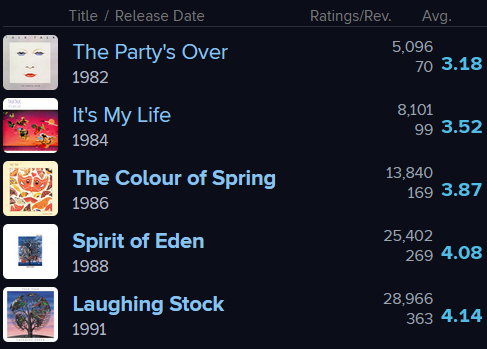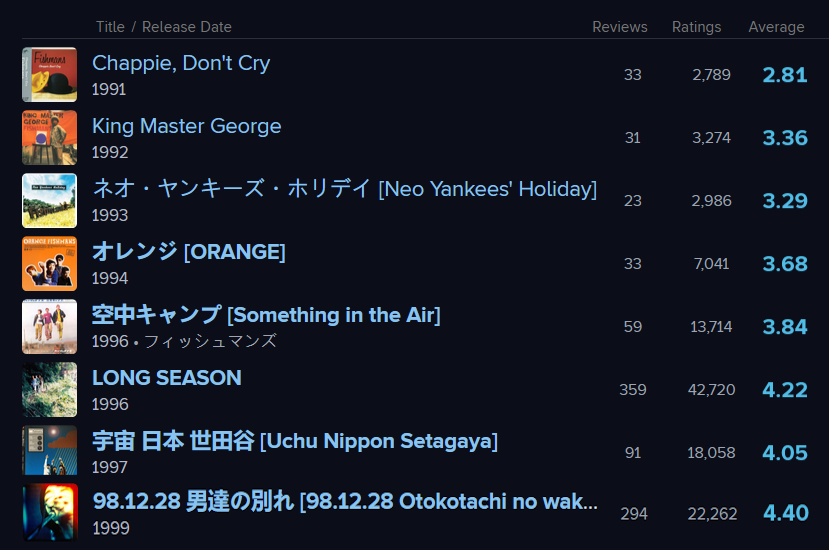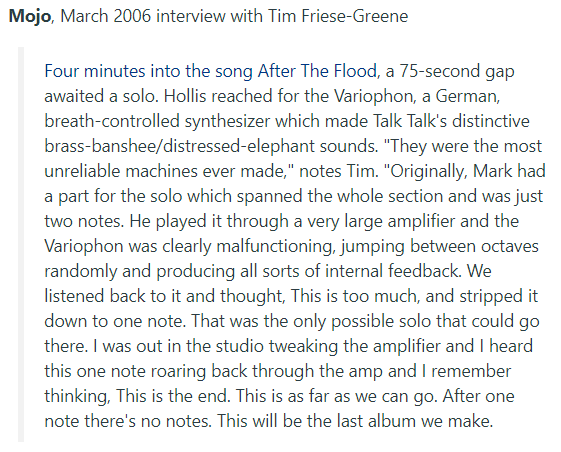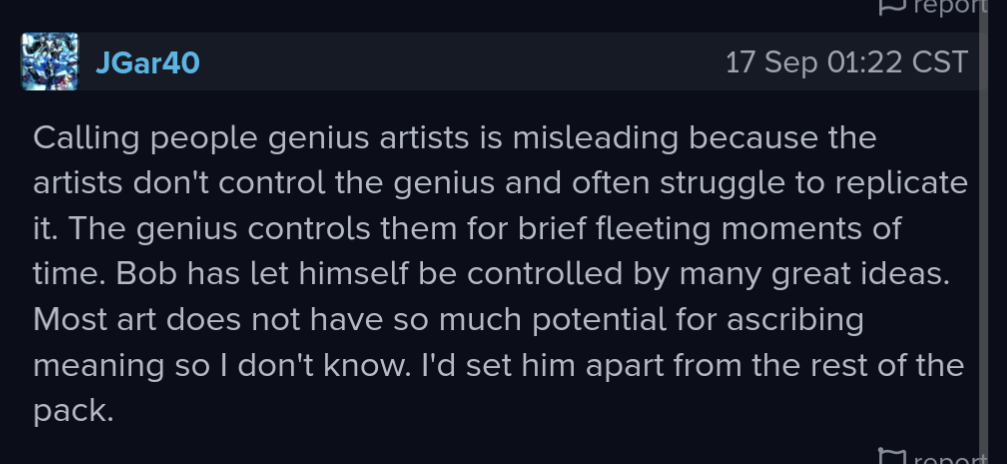♫ On Artistic Expression in Discographies ♫
Is there a way to tell what makes you like/dislike music? How is it that an artist can only sometimes create something you like? (what makes something good or bad?) A harsh noise musician can play something nice to listen to, and a classicly trained pianist can play something I don't want to hear. Is music truly an aesthetic taste in so that it cannot be communicated through words and can only be related to by pointing to it if someone else also has had that experience? 'It smells like cinnamon' can only be understood if you have smelt cinnamon. Whether or not you like the smell of cinnamon also cannot be determined until you smell it yourself. Is there an inherent nature to smells that would allow you to predict or explain why you like a specific smell? At most, we can say many smells feel positive or negative due to memory association - something that most certainly influences music taste as well. -- So, why don't skilled musicians just always make music that smells good?
I'm not the kind of person that likes to put ratings on art. As a teenager I had many joyful hours delving through the depths of Rateyourmusic.com and updating my ratings almost every day as my tastes changed. However, after a few years, trying to listen to all the music in the world got too overwhelming. I stopped rating music and started listening to only 1 or 2 new albums a month - fully focusing on experiencing & living with the music rather than spending the whole time trying to think of what number to give it to assign it some abstract worth.
I say all this as I am about to use public music ratings as a way to measure a piece of art's worth even though I don't believe in such things (always good to start with a contradiction). I'm going to be using ratings merely as a means of showing widespread acclaim/consensus here in the music listening communities of cyberspace. The Rateyourmusic rating average falls on a 0.5 to 5.0 scale aggregated from all user scores on the website. A score of 3.5-3.6 is typically seen as a good album from an artist. A score of 3.8-3.9 is usually viewed as one of the finest albums released in a year. Anything above a 4.0 is a rarity and is widely regarded as a 'Masterpiece' (e.g. A Love Supreme, Ys, Fôrça bruta, The Velvet Underground & Nico).

This is the Discography of Talk Talk as seen on Rateyourmusic. We see a slope from their first release in 1982 until their final album in 1991. This feels like it makes sense. This is how it should be right? Artists get better over time. A slow but incremental pace of practice, experience, and improving so that when you first start out you won't be very good, but after years of work you've been able to master your craft.

Here is another example of this progress over a discography from the band Fishmans where a decade of work ultimately culminates in their final 'masterpiece.' -And again this feels like it makes sense. There is an almost story-like quality to this arc of art.
But this is not at all the norm. It is incredibly rare for an artist's life of work to follow this clean pattern. A very common occurrence is an early peak followed by releases that fans of the band never love as much and have to go around saying the "I like their older stuff" cliche. Here are examples from the discographies of Built to Spill, Novos Baianos, and Pixies:

Musicianship is a craft, in the same way that it is for a baker, a cobbler, and a tailor. You can learn an instrument, you can learn a song for that instrument, you can perfect it, and you can keep playing it over and over again until your body falls apart. However, the artistic expression within your medium is not as much of a craft as it is an art. You can't refine your heart to push out dozens of songs a day - that only works following a recipe to make the same loaf of bread or same shoe over and over again. However, a musician creating from an earnest place of artistic, personal expression can make unappealing music, while a record label trying to pump out something purely for money can run into a good song, so pure intent can't make good smelling music on its own. A human life is not a simple straight path of progress, so our artistic expression reflects that. (Nonetheless, there is still definitely something to be said for A. An artist aiming and striving for something for which it takes numerous attempts to reach, as well as B. An artwork that is a culmination of what an artist has been working on over some time. These things can definitely be great).

Above is a quote from the producer of Talk Talk's 1991 album Laughing Stock. This would ultimately be the band's last album. The band's development over the years led to an album that I believe to be very special. But even so, I don't believe years of work and pure intentions lead to objectively good music. Because even though I often do have a wonderful experience listening to it, I don't always. I'm not always in the mood, and if I'm not, the finest dish can be unappetizing. Beyond just very skilled musicians making music that isn't to taste, music that you do like can not be to your taste always. The world is mixed and we contain multitudes - it's easier to not try to fit songs into being good or bad, it's nice to just listen. You should only worry if music is good or bad in the context of if you want to listen to it right now. In a wider sense, instead of trying to listen to a ton of music to find the very best, in my experience, it's much nicer when I spend months listening to one album over and over unraveling its depth and letting it seep into my life. Looking back, it's as if your seasons are marked by different periods of art. Just like how a listeners's tastes are not stable, neither is a creator's.

This is a much more interesting - and much more accurate way to approach an artist's life of work. It aligns with what creatives across history have described as the elusive nature of the source of ideas like a muse - divine inspiration. The aspect of developing and changing your music over time has become more prevalent recently with fans often assigning "eras" to an artist's discography. It goes back to literary analysis and art history having used similar terms to describe the different seasons an artist will go through (e.g. Picasso's Blue Period & Rose Period). A notable example of this in popular recording music is David Bowie (from the Ziggy Stardust persona to the Berlin Trilogy). And from here we can see any number of examples of this. Bob Dylan being known for his Acoustic to Electric - his Heartbreak & Religious. Björk known for every album taking place in a new world of visuals, philosophy, and approach to sound. Fans love to argue about which era was best - what was the true masterpiece - what they wish was never released. I think that can be a lot of fun, but it misses the heart of art. It's a tool of communication. It's a means of expression. A way to get something out of your heart and into the world. I think this is why a lot of artists people really love and resonate with follow this pattern of great change throughout the years. The reason you can connect so deeply with the art is that it's truly reflecting where people were in their life when they made it. Divine inspiration captures a spark in the heart that you also have that can smell the same thing. It's not always a straight progression towards perfection - it's the ebbs and flows of life. The changes and turns in the river.
Sidenote 0: Interview about Laughing Stock that highlights the idea that even extremely skilled musicians can feel that only a minority of what they create is something they are happy with. You can improvise on an instrument for 2 hours and only use 2 minutes. You can write 10 pages of a novel and only use 1 paragraph. Mark Hollis Interview.
Sidenote 1: Grand live albums that have the contradiction in the age of online music where a person's first introduction to an artist is through it because it is widely seen as the greatest recording of a musician, but is truly special to long time listeners who have followed the artist over the years and have an understanding on the fullness of a life being drawn on from their musical history, because they were there every step of the way watching their growth. (98.12.28, Juan Gabriel En El Palacio De Bellas Artes, The Ape of Naples)
Sidenote 2: The context that album ratings originally were for trying to sift the sea of releases to choose the one thing you can purchase. Music reviewers have to cover so much music so quickly that they just can't give an album the time and depth needed to form a deep connection. However a quick thing like a rating can give a general idea that an album might be worth looking into from a reliable source that at least put some time into it active listening.
Sidenote 3: Quick note on most of the examples given being of solo artists, not necessarily the norm.
Sidenote 4: Not all music is communication. It can be aesthetic, accidental, or just for fun.